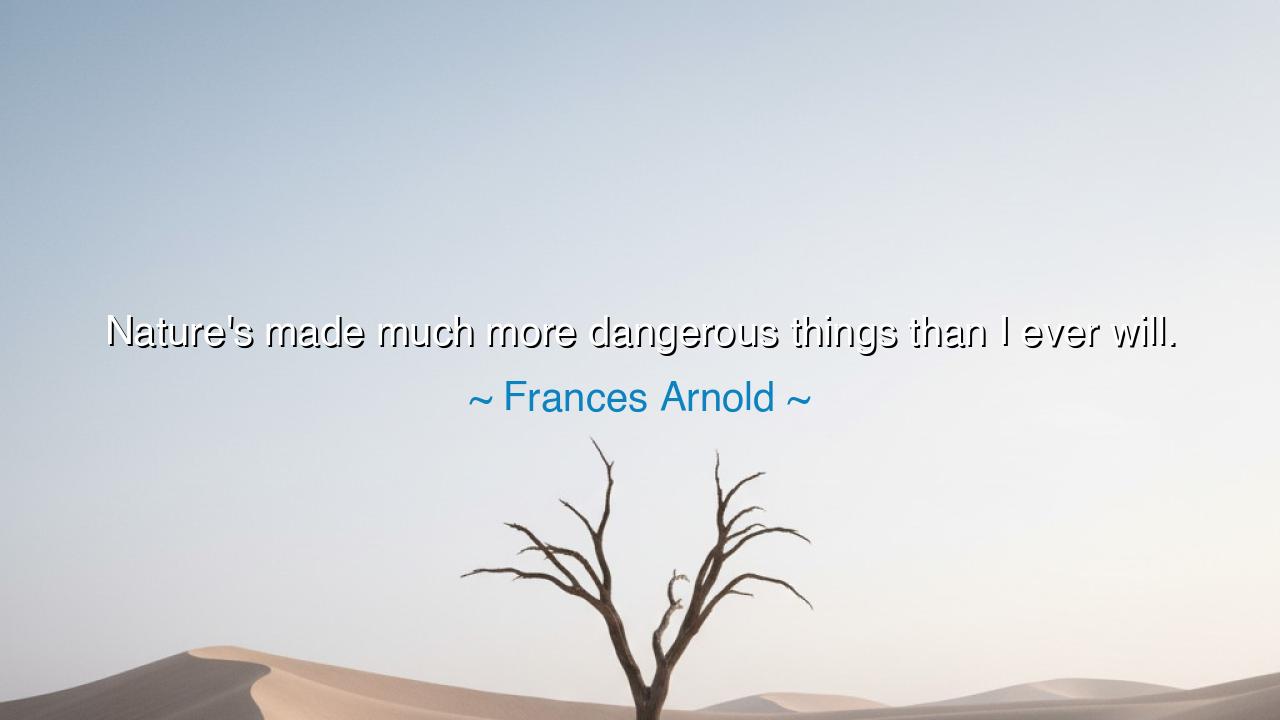
Nature's made much more dangerous things than I ever will.






Hear the words of Frances Arnold, Nobel laureate and pioneer of science, who declared with humility and awe: “Nature’s made much more dangerous things than I ever will.” These words, though spoken in the realm of modern invention, echo with the resonance of ancient truth. They remind us that the creations of humankind, however clever, remain but small shadows when compared to the vast, untamed power of the living world.
For what are the weapons of man beside the fury of the volcano, the relentless surge of the hurricane, or the silent hunger of the plague? The ancients trembled before these forces, naming them gods and spirits, for they knew their frailty against such power. Even today, with all our machines and sciences, we bow before nature’s unyielding hand. In this truth lies wisdom: that we must never mistake our own cleverness for supremacy over the earth.
Consider the story of the Black Death in the fourteenth century. It was not forged by human hands, nor planned by human minds, yet it swept across continents, silencing millions, reshaping nations, humbling kings and peasants alike. What empire of men, what weapon of steel, could wield such world-altering force? None. It was the work of unseen nature, a reminder that all human power stands fragile before the mysteries of life and death that she commands.
And yet, Frances Arnold speaks not with fear, but with reverence. As one who has shaped molecules and guided the evolution of enzymes, she knows the might of creation at the smallest scales. Still, she bows to nature, confessing that her craft, however ingenious, is but a child’s play compared to the dangerous and magnificent arsenal already present in the world. This is not weakness—it is humility, and humility is the root of wisdom.
But hear also the encouragement hidden within these words. If nature has created terrors, she has also created cures, resilience, beauty, and life itself. The same world that births the earthquake also births the forest; the same hand that holds the serpent also holds the flower. Thus, the wise do not despair at the dangers of nature, but learn to collaborate with her, to seek harmony rather than domination.
The lesson, then, is twofold. First, do not overestimate your own power, for nature will always remind you of your limits. Second, do not underestimate her generosity, for within her mysteries lie answers to healing, sustenance, and survival. The scientist, the artist, the leader—all must approach the world with the humility of a guest, not the arrogance of a conqueror.
Take this into your life: walk with reverence upon the earth. Do not believe that your works, however grand, exceed the forces of fire, water, wind, and time. Instead, learn from them. Study the patterns of nature, and in them find both caution and inspiration. Use your creativity not to outmatch her, but to align with her wisdom. Plant trees, tend the soil, respect the sea, and guide your inventions with humility.
So let the words of Frances Arnold echo in your heart: “Nature’s made much more dangerous things than I ever will.” Let them remind you that your power lies not in rivalry with nature, but in partnership with her. For those who stand in awe of the earth shall endure, while those who scorn her will be swept aside. And in that awe, you will find not only fear, but also wonder, strength, and the path to true wisdom.






AAdministratorAdministrator
Welcome, honored guests. Please leave a comment, we will respond soon